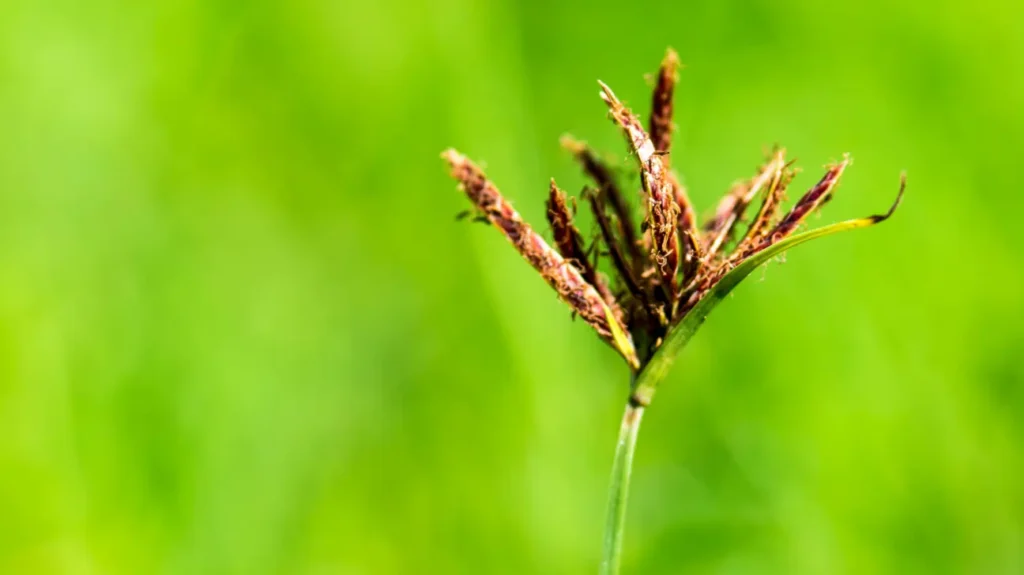Purple Nut Sedge, scientifically known as Cyperus rotundus, is a perennial plant belonging to the Cyperaceae family. This species is notable for its widespread distribution across tropical and subtropical regions and is commonly recognized as a weed due to its invasive nature. Despite its reputation, Purple Nut Sedge has garnered attention for its potential medicinal properties, including its use as a nootropic supplement. Nootropics are substances that may enhance cognitive function, memory, creativity, or motivation in healthy individuals. This article aims to provide a comprehensive analysis of Purple Nut Sedge, focusing on its chemistry, physiological mechanisms, potential nootropic benefits, dosing guidelines, side effects, interactions with other supplements and medications, and important safety considerations.
You May Also Like:
Sources of Purple Nut Sedge
Purple Nut Sedge is native to various regions worldwide, thriving in tropical and subtropical climates. Its prevalence in disturbed soils, agricultural fields, and gardens contributes to its classification as a weed. The plant is characterized by its triangular stems, elongated leaves, and distinctive purple flower clusters. While it is often viewed negatively in agriculture due to its invasive growth habits, traditional medicine systems in various cultures recognize its potential health benefits. Various parts of the plant, including the rhizome and leaves, have been utilized for their medicinal properties.
Traditional Uses and Ethnomedicine
Historically, Purple Nut Sedge has been employed in traditional medicine for various ailments. In Ayurveda, it is referred to as “Musta” and is used to address digestive issues, inflammation, and urinary disorders. In Chinese medicine, it has been utilized for its diuretic and anti-inflammatory properties. These traditional uses highlight the plant’s potential therapeutic benefits, which have prompted scientific investigations into its active compounds and physiological effects.
Transform Your Wellbeing with Amazon’s Best Multivitamins for Brain and Body Support—Find Out More!

Chemistry of Purple Nut Sedge
The pharmacological effects of Purple Nut Sedge are primarily attributed to its bioactive compounds, which include flavonoids, alkaloids, and essential oils. These compounds contribute to the plant’s anti-inflammatory, antioxidant, and neuroprotective properties, making it a candidate for nootropic applications.
Key Active Ingredients
- Flavonoids: These polyphenolic compounds exhibit potent antioxidant activity, helping to neutralize free radicals and protect cells from oxidative stress. Flavonoids are known for their ability to cross the blood-brain barrier, making them particularly relevant for cognitive health.
- Alkaloids: Purple Nut Sedge contains various alkaloids, such as cyperine and cyperotundone, which have been studied for their effects on the central nervous system. Alkaloids often interact with neurotransmitter systems, potentially influencing mood and cognitive function.
- Essential Oils: The volatile oils derived from Purple Nut Sedge are rich in compounds like camphor and borneol, which possess anti-inflammatory and analgesic properties. These essential oils may also contribute to the plant’s neuroprotective effects by enhancing blood circulation to the brain.

Physiological Mechanisms of Purple Nut Sedge in the Body and Brain
The potential nootropic effects of Purple Nut Sedge can be attributed to its influence on various physiological mechanisms in the body and brain. The plant’s bioactive compounds may interact with neurotransmitter systems, support neuroprotection, and enhance cognitive function.
Neuroprotective Effects
Purple Nut Sedge may exhibit neuroprotective properties through several mechanisms, including:
- Antioxidant Activity: The flavonoids and other antioxidant compounds in Purple Nut Sedge help combat oxidative stress, a major contributor to neurodegenerative diseases. By reducing oxidative damage in neural tissues, these compounds may protect against cognitive decline associated with aging and conditions like Alzheimer’s and Parkinson’s disease.
- Anti-inflammatory Effects: Chronic inflammation is implicated in numerous neurological disorders. Purple Nut Sedge’s anti-inflammatory properties may help mitigate neuroinflammation, thus promoting a healthier brain environment. This is particularly important as neuroinflammation has been linked to cognitive impairment and neurodegenerative diseases.
- Neurotransmitter Modulation: The alkaloids found in Purple Nut Sedge may interact with neurotransmitter systems, including dopamine and serotonin. These interactions may influence mood, focus, and overall cognitive performance, potentially enhancing learning and memory.
Top Amazon Picks: Supplements for Stress Relief and Improved Mood—Buy Now on Amazon!

Enhancement of Cognitive Function
The combination of neuroprotective effects and neurotransmitter modulation positions Purple Nut Sedge as a potential nootropic. The plant’s ability to enhance cognitive function can be attributed to:
- Increased Energy Metabolism: By supporting mitochondrial function and ATP production in brain cells, Purple Nut Sedge may improve energy availability for cognitive processes. Adequate energy supply is essential for optimal neuronal function, facilitating learning and memory formation.
- Memory Enhancement: Some studies suggest that compounds in Purple Nut Sedge may enhance memory retrieval and consolidation. This effect is particularly valuable for individuals seeking to improve their learning capabilities and overall cognitive performance.
- Mood Improvement: By modulating neurotransmitter levels, Purple Nut Sedge may promote a positive mood and reduce anxiety. This emotional enhancement may indirectly support cognitive performance, as a positive mindset is often linked to better focus and productivity.
Nootropic Benefits of Purple Nut Sedge
The potential nootropic benefits of Purple Nut Sedge are increasingly recognized in the realm of cognitive enhancement. While scientific research is still developing, several promising benefits have emerged:
- Enhanced Cognitive Performance: Due to its neuroprotective and mood-enhancing properties, Purple Nut Sedge may contribute to improved cognitive performance, including better memory retention, enhanced focus, and increased mental clarity.
- Support for stress and Anxiety Management: The plant’s ability to modulate neurotransmitter systems may be beneficial for individuals experiencing stress and anxiety, providing a natural alternative to pharmaceuticals for managing these conditions.
- Cognitive Resilience: Regular consumption of Purple Nut Sedge may promote cognitive resilience, helping the brain withstand the effects of aging and stress. This resilience is particularly important in preventing age-related cognitive decline.
- Potential for Neurodegenerative Disease Prevention: Given its antioxidant and anti-inflammatory properties, Purple Nut Sedge may play a role in preventing neurodegenerative diseases by protecting against oxidative damage and inflammation in the brain.

Dosage and Supplementation Guidelines
When considering Purple Nut Sedge as a nootropic supplement, determining the appropriate dosage is essential for safety and efficacy. However, research on specific dosages for cognitive enhancement is limited, and recommendations may vary based on individual needs and health conditions.
General Dosage Recommendations
- Standard Dosage: Preliminary studies suggest that a daily dosage of 200 to 400 mg of standardized extract may be effective for cognitive enhancement. It is crucial to select high-quality supplements from reputable sources to ensure proper dosing and efficacy.
- Therapeutic Dosage: For specific health conditions, higher dosages may be explored under professional supervision. However, individuals should always start with lower doses to assess tolerance.
- Supplement Forms: Purple Nut Sedge is available in various forms, including capsules, powders, and tinctures. Capsules and powders are common choices, allowing for flexible dosing according to individual preferences.
Consultation with Healthcare Professionals
Before starting any new supplement, including Purple Nut Sedge, individuals are advised to consult with healthcare professionals, especially if they have underlying health conditions or are taking other medications. This precaution ensures that supplementation is safe and tailored to individual needs.
Maximize Your Sleep Quality with Amazon’s Top Sleeping Supplements—Shop Today on Amazon!
Side Effects and Safety
Purple Nut Sedge is generally regarded as safe for most individuals when taken in appropriate dosages. However, like any supplement, it may have side effects, especially at higher doses or with prolonged use.
Potential Side Effects
- Gastrointestinal Disturbances: Some individuals may experience mild gastrointestinal discomfort, including nausea or diarrhea, particularly when starting supplementation or taking high doses.
- Allergic Reactions: While rare, allergic reactions to Purple Nut Sedge may occur in sensitive individuals. Symptoms can include rash, itching, or swelling, and those with known allergies should exercise caution.
- Dizziness or Fatigue: Some users may report dizziness or fatigue when first introducing Purple Nut Sedge into their regimen, particularly if they are sensitive to changes in neurotransmitter levels.
Safety Considerations
- Individual Variability: Each individual’s response to Purple Nut Sedge may differ based on factors such as age, health status, and existing medications. Monitoring for adverse effects is essential, especially during the initial phase of supplementation.
- Pregnancy and Nursing: Limited research exists on the safety of Purple Nut Sedge during pregnancy and breastfeeding. Therefore, pregnant or nursing individuals should consult a healthcare provider before use.
- Underlying Health Conditions: Individuals with certain health conditions, such as liver or kidney disease, should be cautious with Purple Nut Sedge supplementation. It is advisable to seek professional guidance to ensure safety and appropriate dosing.
Interactions with Other Supplements and Medications
Understanding potential interactions between Purple Nut Sedge and other supplements or medications is crucial for safe supplementation. Certain combinations may enhance or diminish the effects of either substance, leading to unintended consequences.
Possible Interactions
- Antidepressants: Given Purple Nut Sedge’s influence on neurotransmitter systems, individuals taking antidepressants should exercise caution. The combination may lead to increased serotonin levels, potentially resulting in serotonin syndrome—a rare but serious condition.
- Anxiolytics and Sedatives: If used in conjunction with anxiolytic or sedative medications, Purple Nut Sedge may amplify the sedative effects, leading to excessive drowsiness or impaired cognitive function.
- Stimulants: When combined with stimulant medications, Purple Nut Sedge could modulate energy levels and mood. However, individuals should monitor their response to prevent excessive stimulation.
- Other Nootropics: Purple Nut Sedge may be safely combined with other nootropic substances, but individuals should monitor their overall cognitive load to avoid overstimulation or adverse effects.
Experience the Benefits of Nootropics with Amazon’s Best Supplements—Shop Now!

Purple Nut Sedge for Cognitive Resilience and Health
Purple Nut Sedge (Cyperus rotundus) represents a fascinating plant with a rich history of traditional medicinal use and emerging potential as a nootropic supplement. Its bioactive compounds exhibit promising neuroprotective, antioxidant, and anti-inflammatory properties, which may enhance cognitive function, support mood regulation, and contribute to cognitive resilience. However, while preliminary findings are encouraging, further research is necessary to establish optimal dosing guidelines and fully understand its effects on cognitive health.
As with any supplement, individuals should consult with healthcare professionals before incorporating Purple Nut Sedge into their regimen, particularly if they have underlying health conditions or are taking other medications. By taking a cautious and informed approach, individuals can explore the potential benefits of Purple Nut Sedge while ensuring their safety and well-being in the journey toward enhanced cognitive health.

References:
- Cyperus rotundus: A potential medicinal plant. Retrieved from: https://www.phytojournal.com/archives/2024.v13.i2.A.14867/cyperus-rotundus-a-potential-medicinal-plant
- Cyperus spp.: A Review on Phytochemical Composition, Biological Activity, and Health-Promoting Effects. Retrieved from: https://onlinelibrary.wiley.com/doi/full/10.1155/2021/4014867
- Chemical Investigation and Pharmaceutical Action of Cyperus rotundus – A Review. Retrieved from: https://www.tandfonline.com/doi/abs/10.1080/22311866.2013.833381
Important Note: The information contained in this article is for general informational purposes only, and should not be construed as health or medical advice, nor is it intended to diagnose, prevent, treat, or cure any disease or health condition. Before embarking on any diet, fitness regimen, or program of nutritional supplementation, it is advisable to consult your healthcare professional in order to determine its safety and probable efficacy in terms of your individual state of health.
Regarding Nutritional Supplements Or Other Non-Prescription Health Products: If any nutritional supplements or other non-prescription health products are mentioned in the foregoing article, any claims or statements made about them have not been evaluated by the U.S. Food and Drug Administration, and such nutritional supplements or other health products are not intended to diagnose, treat, cure, or prevent any disease.


